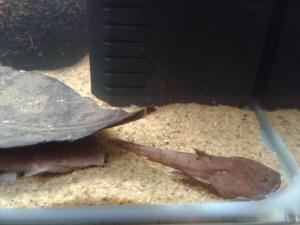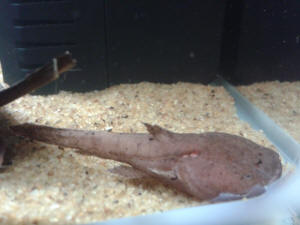|
Sick Chaca 1/1/13
Dear Neale,
Happy New Year to you and to all of the Wet Web Media Crew.
<Thank you, Dennis.>
I should have really emailed days ago, but now I'm sure I need your
expert advice. I brought home another young Chaca Bankanensis, even
though I knew he wasn't really looking very well at all in his display
tank.
<Oh…>
I couldn't bear the thought that his health might deteriorate even more
or worse. The guys at the aquatics shop are great, but I simply had to
take the Chaca home and try to give him the attention and care he
deserves.
<Let's hope he recovers so you can enjoy him!>
He has 3 small but noticeable holes, revealing white flesh inside, above
the pectoral fins. On his head, it looks like there might be one or two
more appearing, though so far not as severe as the other ones on his
body. More worryingly, he is also very swollen on the body and face,
that his eyes are almost undetectable on top of the head. I'm not sure
he is just bloated, but I know for sure this rounded, swollen appearance
is not normal for this species.
<I agree. Without seeing the fish, it's very hard to be sure what's
going on here. But since you're in the UK, let me recommend eSHa 2000 as
a good "first" medication in cases like this. It treats Finrot and
Fungus very effectively, and can help against Dropsy. It's an
inexpensive medication and seems to be tolerated well by sensitive fish
like catfish and even pufferfish.>
His behaviour otherwise normal and colouration is very nice for a
juvenile.
<Good signs; if he's feeding normally, then chances are you can help him
get better.>
As you might remember, I am using a 50/50 ratio RO/tapwater mix in my
system, 25% changed weekly. To try to stimulate blackwater conditions, I
have added one JBL NanoCatappa almond leaf and a Peat Ball from Tyne
Valley Aquatics. Water parameters using JBL EasyTest test strips are:
pH 6.5 - 7
KH 6 - 10 degrees d
GH >6 degrees d
Ammonia 0, Nitrite 0, Nitrate 25mg/l
The temperature in my tank is 26 degrees Celsius…
<All sounds ideal.>
The other Chaca I have already is doing well. I would really like to
think I could bring this new one back to full health, but what do you
think is wrong with him exactly?
<Very hard to say, but the commonest problems in aquarium shops are
physical damage (e.g., nipping by tankmates) and simple starvation.
These are easily fixed if caught early on. Since yours is active and I
assume feeding, then you may be "just in time".>
I have some Chloramine T on standby, but am a bit nervous about dosing
so haven't even attempted to use it. I was thinking of using eSHa 2000,
but do you think it will work and do you know if it stains clear
silicone?
<eSHa 2000 does not stain silicone. It is an alarming green colour, but
doesn't seem to last for long. Don't forget to remove carbon from the
filter, if used.>
Please help Neale....
Dennis
<Hope this helps, Neale.>
Sick Chaca images 1/1/13
Dear Neale,
Thank you so much for coming to the rescue! I'm sorry for not attaching
any before, but I hope that these images of my fish will help...Please
tell me what you think
Dennis
<Hello again Dennis. Does look like physical damage and the catfish
itself seems very underweight. "Tender loving care" will be the thing
here! Get this fish feeding regularly, provide good water quality, and
medicate as per Finrot. Cheers, Neale.>
|

 |
Chaca bankanensis "Chocolate" Frogmouth Catfish
11/27/12
Hello guys,
I hope you are all doing well. I am currently keeping a juvenile Chaca in
a 25 litre aquarium. I haven't had him long but he is doing okay. I am
aware that Chaca inhabit dark, peaty conditions in the wild. However, he
is currently being kept in dechlorinated London tap water with
Waterlife's 7.2 Buffer product. The parameters are pH 7.2, GH 14
(approx.) and KH 15 (approx.). I seriously want to start using a either
an RO/tap water mix or just pure RO with Tropic Marin Tropic
Re-mineraliser as soon as possible. How best can I achieve the right
balance and optimum conditions, avoiding PH crashes in particular, as I
am planning to use Almond Leaves and Blackwater Extract in order to
provide trace elements?
Please help. Thank you
Dennis Ramirez
<This species isn't demanding in terms of water chemistry, something
typical of catfish generally. Diet is usually the problem with these
stealth predators. Anyway, the 50/50 tap water/RO water mix your suggest
should work very well. There should be enough remaining carbonate
hardness (around 7-8 degrees KH) to ensure a stable pH, particularly if
you provide regular water changes and avoid overstocking/overfeeding.
Good luck, Neale.>
Re: Chaca "Chocolate" Frogmouth Catfish
Dear Neale,
Thank you for your reply. First of all can i say what an honour it is to
hear from you.
<Aw, shucks...>
I have read and heard many similar and somewhat confusing
articles/advice regarding giving the best care for this species. Helpful
to some extent, however, I must say that getting help from someone such
as yourself with your standing in our hobby is a real pleasure. I
really cannot thank you enough, Neale...best wishes to you and the rest
of the team!
Sincerely,
Dennis.
<Thanks for the very kind words. Best of luck with this fascinating
catfish. Do visit (and join!) the PlanetCatfish.com forum -- there are
some really good people there who'll help you a lot. Cheers, Neale.>
Re: Chaca Bankanensis "Chocolate" Frogmouth Catfish
11/27/12
Hello again Neale,
<Dennis,>
I am very glad that you share in the opinion that Chakas are a
fascinating species of catfish!
<For sure!>
As I mentioned, I am very lucky to have a juvenile (2.5 inches) and his
water temperature is 27C. I also agree that there is a bit of an issue
regarding the feeding of these fish.
<They do have a reputation for "live food only" but that doesn't
necessarily mean live fish. So if you're able to supply things like
earthworms and river shrimps, you can do okay with them. There are
problems with Chaca spp. that they only eat food that comes down to the
bottom, which means the most easily bred "feeders" like Guppies aren't
an option.
As you may know, I'm not wild about the use of feeder fish generally,
though home-bred feeders of certain sorts of Thiaminase-free species
(like Poeciliidae) may be justified in cases like yours where the fish
is very difficult to feed.>
Currently, I am providing Brine shrimps and small river shrimps
alternately once a week.
<Sounds about right. The fact yours is taking invertebrates is extremely
promising, and augurs well for the future.>
Would you regard this as too little, not often enough or varied as a
regimen in your opinion, for a juvenile Chaca?
<They hardly move at all, so a decent-sized meal that fills their mouth
once or twice a week is going to be ample.>
I am equally fascinated with the idea of feeding from tongs at some
point as well so wish me luck with that!
<Would start this sooner rather than later. Juveniles of most fish snap
at all sorts of things, but adults are dumber and try out new foods more
slowly. So, if you can offer something like a small earthworm now, using
forceps (easily bought on eBay and the like for a couple of quid) you
should find your catfish goes for the movement. In time, if he learns to
associate you with dinner, he'll take dead food, things like chunks of
prawn. That's the theory, anyway.>
I hope to hear from you again. Best wishes, Dennis
<Cheers, Neale.>
Re: Chaca Bankanensis "Chocolate" Frogmouth Catfish
11/28/12
Your opinions and advice mean very much and have also served to
reinforce my own knowledge about Chaca spp. Thanks again Neale, my Chaca
and I feel a lot more confident about the future, thanks to you! All the
best, Dennis
<All the best to you, too! Neale.>
|
|

